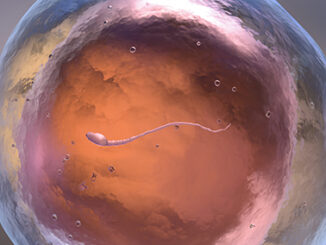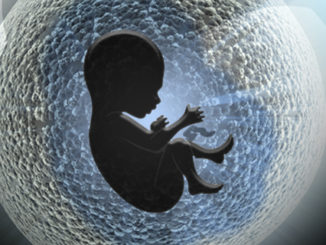Epigenetic inheritance, especially transgenerational epigenetic inheritance, is an important topic in epigenetic research. Do we pass down epigenetic marks to our children as a result of our lifestyle or behavior? Can this occur even long before conception and during pregnancy? Epigenetic studies suggest that the actions of a future mother or father can have long-lasting health effects on their children for years to come.
Studies show that certain DNA methylation marks can survive genome-wide reprogramming and be inherited. For example, a father’s exposure to phthalates could adjust epigenetic marks on sperm DNA and impact a couples’ ability to have children. A father’s diet and supplement intake could also influence his child’s mental fitness.
Mothers can influence epigenetic marks on their offspring’s DNA as well, changing how their baby will react to stress, whether or not they grow up healthy, and their ability to learn, remember and adapt as adults. The Mediterranean diet during pregnancy was shown to epigenetically reduce a child’s risk of disease.
Explore the ways in which lifestyle and habits of a mother and father – and potentially even grandparents or great-grandparents – may influence the epigenetic marks and health of later generations via epigenetic inheritance.
Check out our comprehensive e-book Epigenetics in Life: What We Eat to learn more about how different foods influence health.
Growing up amid adversity, encompassing elements like poverty, child maltreatment, and community violence, not only poses a significant risk for psychopathology and lifelong health challenges but also has been shown to accelerate the biological or epigenetic aging process in children. However, a new study featuring research conducted in the lab of Professor Justin Parent, an assistant professor of psychology at the University of Rhode Island, has introduced a promising prospect. Positive parenting interventions might hold the key to slowing down [more…]
From the moment a child is born, a mother’s love and care are crucial for their physical and mental development, especially during the critical early stages of infancy. The environment and experiences children encounter during these formative years can have a lasting impact on their biology and health, even influencing future generations. Recently, a study out of Washington State University (WSU) has added to our understanding of the crucial role played by mothers. The study found that a mother’s behavior [more…]
Our understanding of early development and its importance for lifelong health is constantly evolving, thanks in part to the growing field of epigenetics. We now know that parents pass along more than just their genes – they also transmit molecular mechanisms that control how genes are expressed. These epigenetic gene regulators help ensure the normal development of a child. However, only a few genes in our genome carry the epigenetic data of our parents. These “imprinted genes” are either expressed [more…]
Children are a blend of both their parent’s genes, but not necessarily in an equal way. Some genes inherited from either the father or mother are epigenetically marked with information that causes them to be inactive. This phenomenon is known as genomic imprinting and, although normal, could lead to disease if combined with mutations. For the most part, we acquire two working copies of each gene – one from our dad and one from our mom. Although in genomic imprinting, [more…]
“Nature vs. nurture” is an argument as old as time, and understanding how “nature” is expressed and how “nurture” carries lasting effects in individuals is important in determining health outcomes later in life, especially when it comes to the bond shared between a mother and her child. As we know, when a mother breastfeeds her child, she provides the baby with antibodies and nutrients to help ensure a healthy immune system, as well as other positive health benefits. A mother [more…]
Assisted reproductive technology (ART) has helped millions of families give birth to babies furthering their own genetic lineage, using methods that range from in vitro fertilization through the cryopreservation of gametes. Of course, given the opportunity for errors and the manmade nature of this process, safety is one concern—and yet, as scientist Boris Novakovic notes, “Previous studies have found some epigenetic changes in embryos grown in labs. However, no study has looked for these changes in the same individuals at [more…]
It’s been said before that health begins in the womb. That’s because the conditions we encounter in utero impact not only our well-being in infancy but throughout our entire lives. But what happens when the nutritional environment in the womb is less than favorable? Most epigenetic studies have suggested that embryos respond to adverse environmental conditions by adjusting their gene expression. However, new research proposes something entirely different may occur. Instead of adapting to the environment, random variations in gene [more…]
Many people believe that breastfeeding is the best gift a mother can offer to her child. It has lots of benefits, not only because breast milk contains the right amount of nutrients, but also because it’s packed with lots of antibodies and biologically active compounds that play a key role in boosting a baby’s immune system. We have already seen how maternal nutrition and lifestyle can shape the development and future health of a baby via epigenetic mechanisms. Among many [more…]
DNA is the blueprint from which most living organisms are built. It makes up the genes that carry the distinctive characteristics and information that determine physical appearance and health, and it makes everybody unique. At the beginning of life, human embryos inherit genes from both their mother and father, and although the actual genes cannot be altered, the way they are expressed can be influenced by epigenetics. Parents can have a huge epigenetic influence on the development of an embryo [more…]
Have you ever heard the old saying “you are what you eat?” This is not just an expression anymore, as scientists have discovered that we are what we eat and possibly even what our parents or grandparents ate. As surprising as it sounds, a pregnant woman’s diet and lifestyle, as well as the diet of an infant in his or her first years of life, may shape the child’s lifelong health or cause them to be more disease prone, not [more…]










